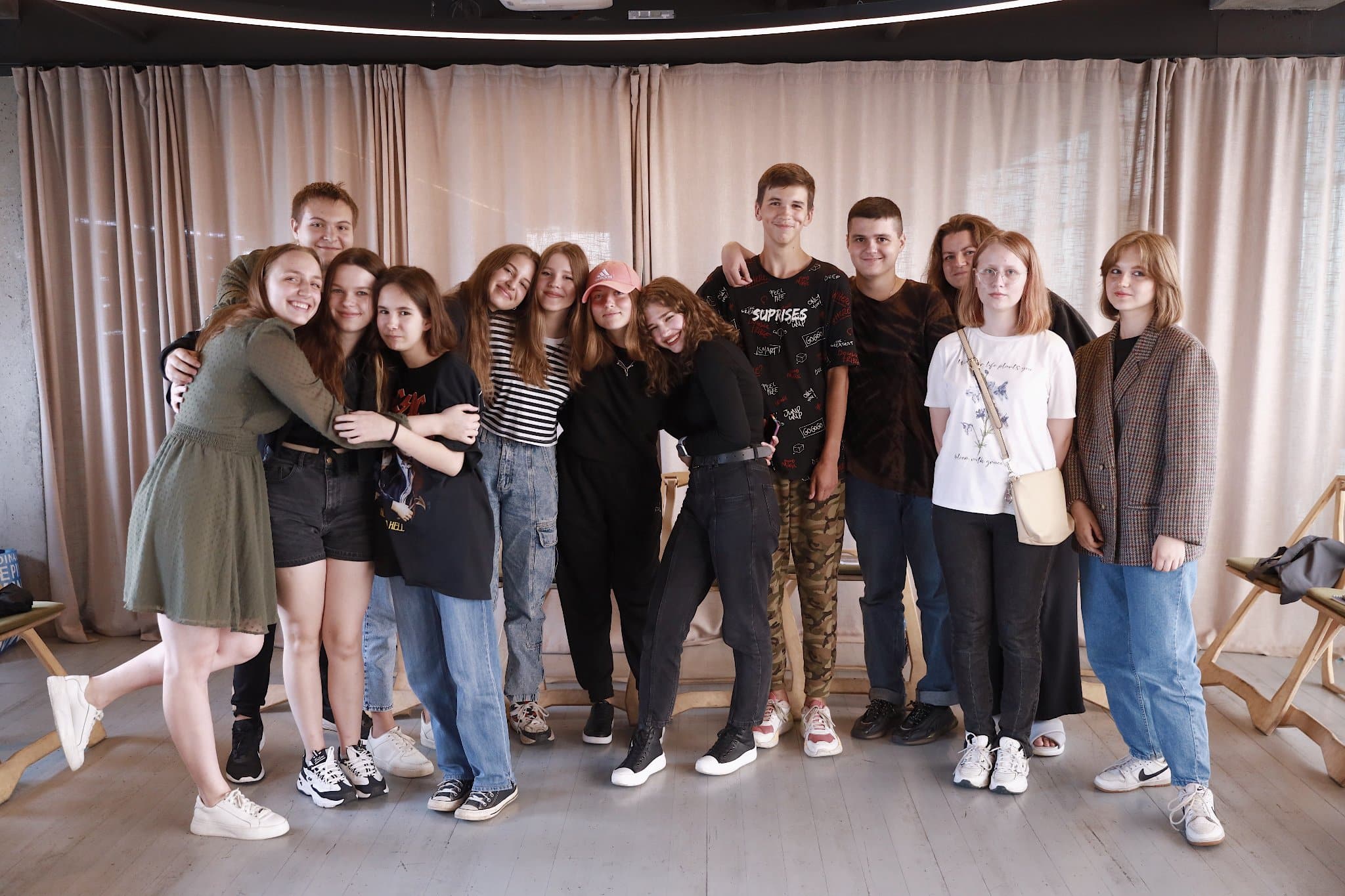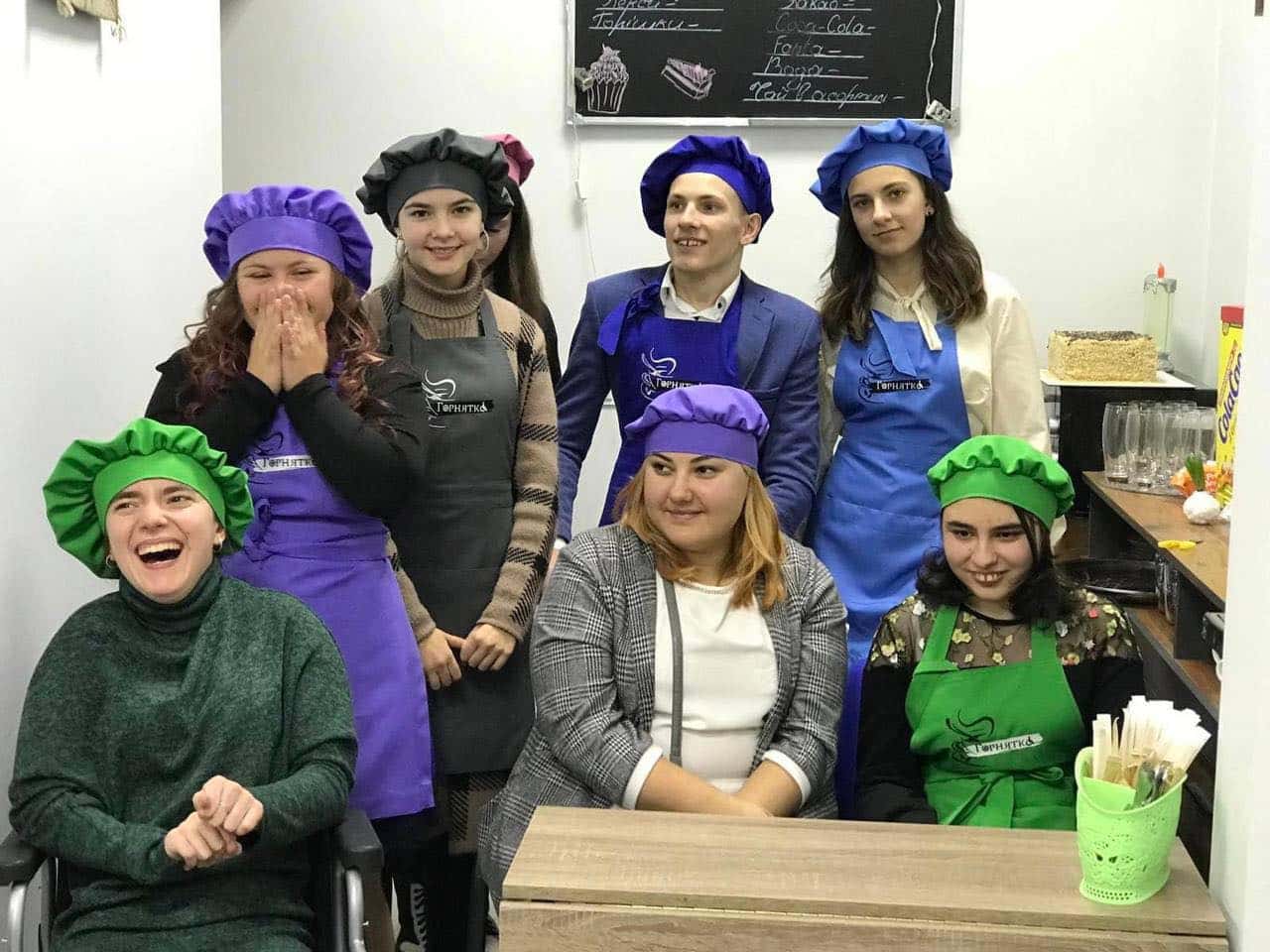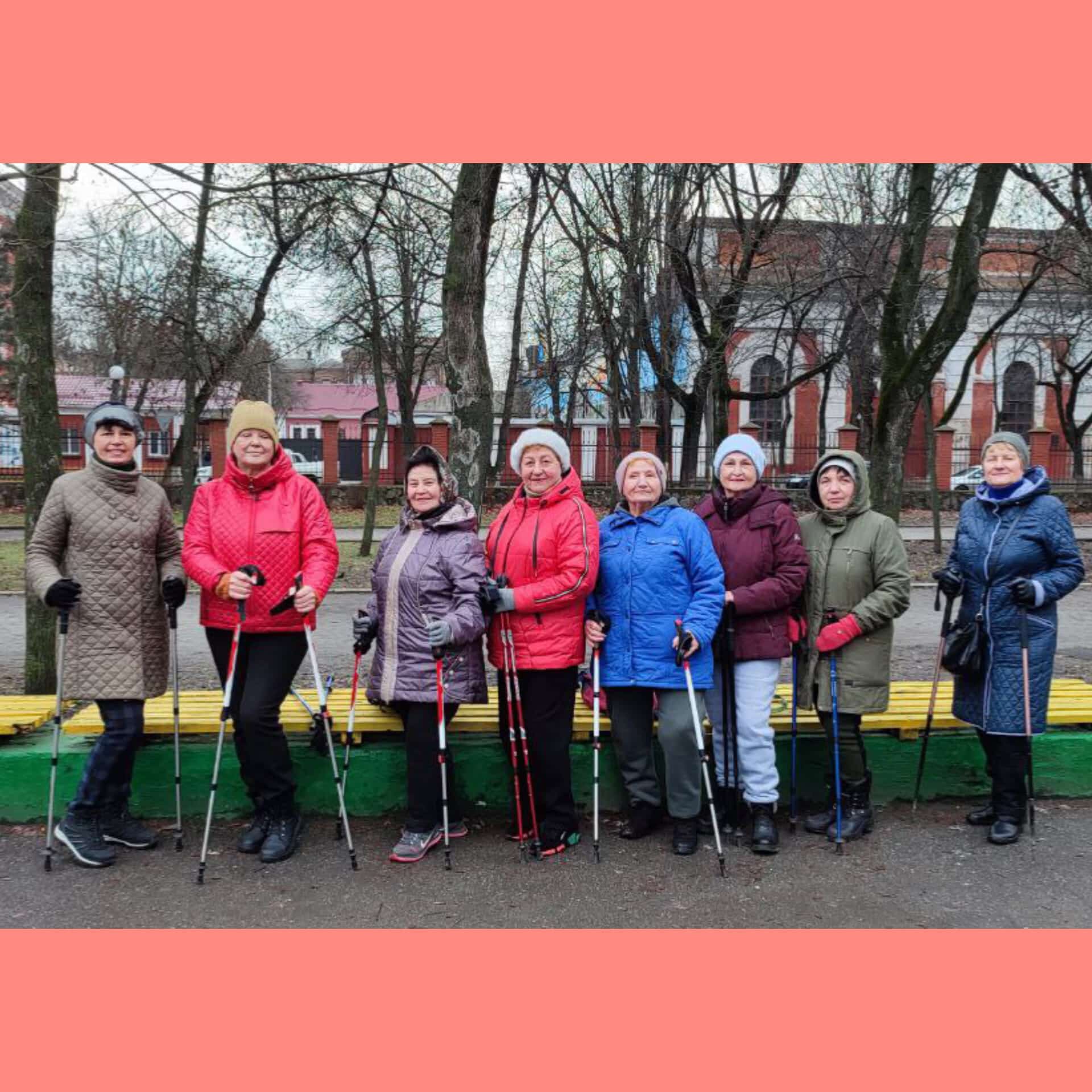There is an integration youth club called «Science of Unity» that operates in Ukraine and helps internally displaced teenagers who found themselves in a new city due to the full-scale Russian military invasion adapt to their new environment. The club’s founders are from a public organization «STEM is FEM» that is helping this project to happen with the support of the «Unity for Action» program.
Within the framework of the «Science for Unity» project, every two weeks local youth and internally displaced young persons in six Ukrainian cities (in Vinnytsya, Khmelnytskyi, Poltava, Lviv, Rivne, Chernivtsi regions) gather with the new speakers and discuss various topics, such as how to find your dream profession and even Ukrainian perspectives on the green energy market. The second half of the meeting is a psychological support club moderated by a professional therapist.
Today we are talking with the founder and CEO of the public organization «STEM is FEM» Yelizaveta Korenko and discussing various topics such as how to help Ukrainian teenagers socialize better, withstand social isolation and reduce stress under conditions of the ongoing war, as well as talking about how science can contribute here.
«Why would you need an engineering degree? You’re a girl!»
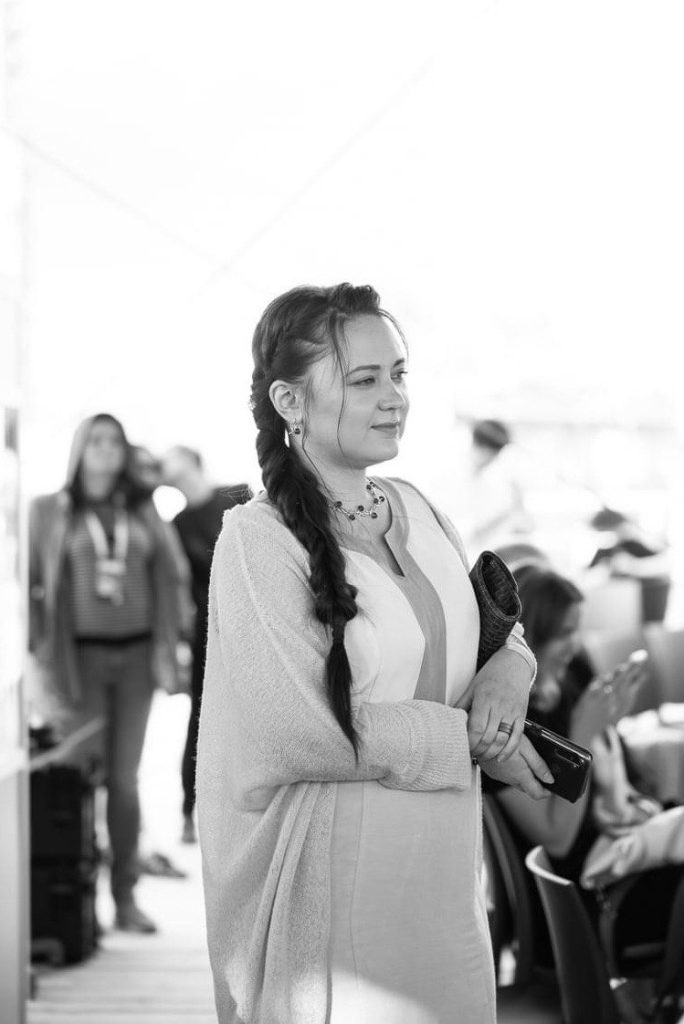
«STEM is FEM» is an educational project to popularise STEM professions (science, technology, engineering, maths) among girls. Its founder is an IT entrepreneur Serhii Tokarev who has offices all over Ukraine and worldwide.
«For many years he was trying to achieve gender parity in his companies,» says Yelizaveta Korenko, a coordinator of the organization. «But the maximum that we were able to achieve was only 30% more women involved. So he became interested to understand why in European countries there are so many women who are employed in the IT sphere, while in Ukraine these numbers are significantly lower. We found out that there are girls who were very much into maths and physics when they were in school. But while choosing their future profession, for some reason they would change their town interests and lean towards some more «humanities» discipline. That’s exactly that moment when women are told something like, «You can start with us as an Administrator, and then probably we will transfer you to the engineering department.» But somehow it never happens! Meanwhile, nobody tells to men, «You can start with us as a security guard, and then we will transfer you to our IT department.»
Members and representatives of this organization constantly hear stories like this from women and girls who participate in their educational initiatives. «When first they tell you in school that you must be a good student,» Yelizaveta adds, «and suddenly when you’re in 11 Grade, they are wondering, «Why do you even need this engineering degree? You’re a girl!». When our modern youth hears testaments like this it provokes cognitive dissonance and confusion in their minds.»
Another issue that the project’s organizers point out is that most Ukrainian school graduates can only name around twenty different possible progressions including those they study in school and those their parents are involved in. «If a child is interested in a certain field where they don’t have any close adult relatives,» says Yelizaveta, «then it can become quite difficult. We don’t have any options of where a school-aged child and a teenager can go to understand what is going on in a job market and how certain professions actually look.»
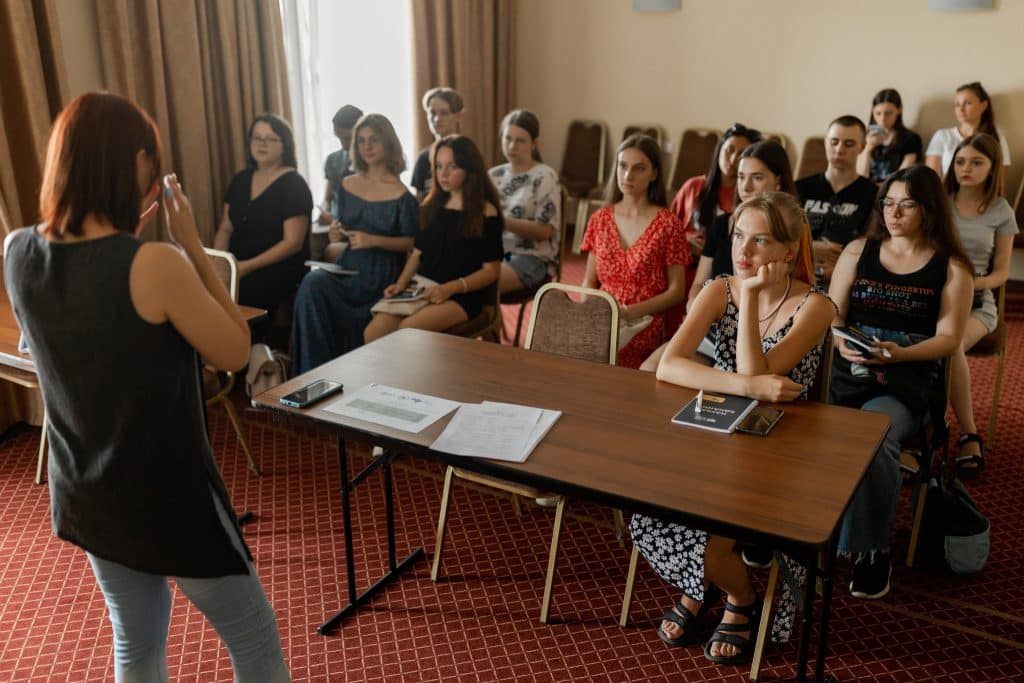
This issue was what this public organization decided to work with. «We do not position ourselves as a huge educational organization,» adds Yelizaveta. «We just set up events for the youth where they have two days to make themselves familiar with different professions. For example, we are talking about biotechnologies, engineering, or 3-D modelling, and we are talking about where and how all these things are applied, who works in these industries, what professions are available, and what you need to learn if you want to get one of these professions, etc.»
Another direction that this public organization work in is public events to promote gender equality. For instance, they launched a «Science is She» campaign when five famous modern Ukrainian artists created twelve portraits of famous female scientists. Female participants from all over Ukraine wrote essays about women who contributed greatly to world science. There were 565 works submitted to completion. These projects were exhibited in many countries, including the main offices of UNESCO in France and the UN headquarters in the U.S.
Culture of psychological help in Ukraine is still in its initial stages»
The topic of war was important for the public organization «STEM is FEM» throughout the years of its existence. Since 24 February, the project’s team has been in different places, with some of its members evacuating from Irpin and other territories temporarily occupied by Russia. Yelizaveta tells us that during this time they’ve re-established their contacts with their community, which included nearly 350 girls.
«So we started asking them,» says one of the project’s organizers, «who found jobs, where and how they got them, and we also wanted to know what we could do to help, as we understood that our usual format wasn’t relevant anymore. So we decided to focus on what we really could do for our participants. And their main request turned out to be psychological support.»
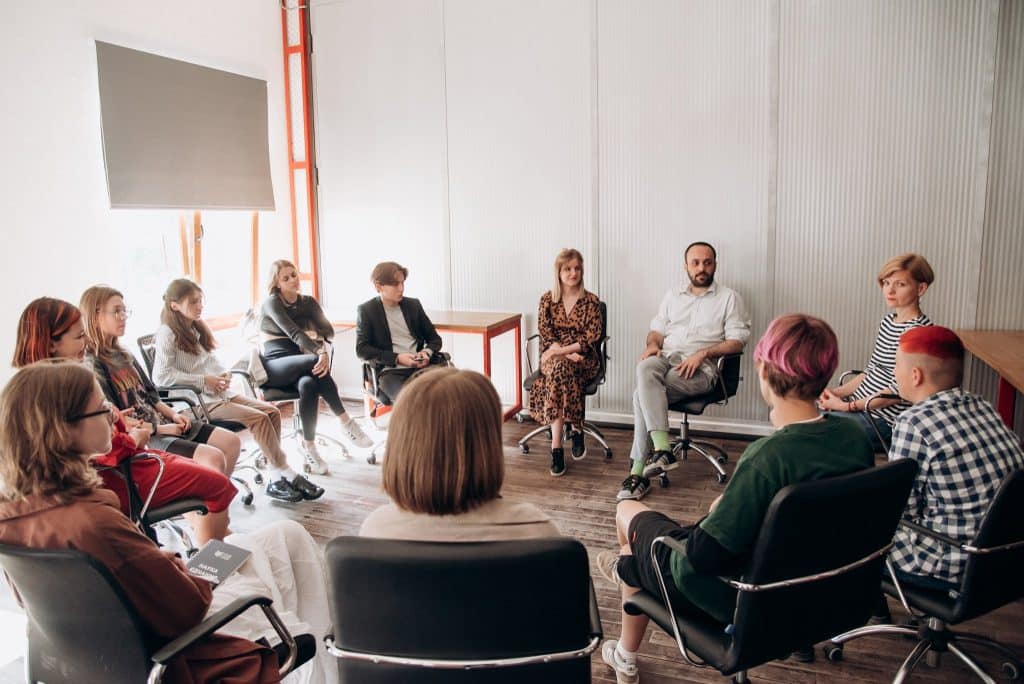
The project’s coordinator also emphasizes that it is quite difficult to be a teenager anyway. «Just recalls the times when you were a teenager,» says Yelizaveta. «You will understand that when you’re a teenager the whole world looks too complicated, too unsure, and hostile to you. And now the work suddenly became really dangerous. In many cases, due to war, adult family members are often too busy making sure their families survive. Someone needs to be evacuated to safer locations, someone else has lost their job. It can become hard for many parents to pay enough attention to their children’s spirits and mental health, as they need to be resolving the problems they are facing now.»
However, modern teenagers have so many of their own problems. Some of them had to go to a new city or maybe even country, where they don’t know anyone and don’t even have anybody to talk to, while others stayed at home, but all their friends have left, and others don’t even understand what can be done in this situation.
«Some of them hear from their parents that they need to leave the country and travel abroad soon,» explains Yelizaveta. «They offer them to study abroad and not return. And what happens if teenagers don’t want to go to a new country? There are so many feelings and situations here that are way too complicated to be resolved on their own when you’re only 15 years old.» That’s why public organization representatives started talking about organizing psychological help groups or providing teenagers with individual therapist consultations. «Unfortunately, we are also dealing with the situation,» says Yelizaveta, «that the psychological help culture in Ukraine is still in its initial stages.
Sometimes it is pretty hard to convince an adequate adult person to go see a therapist, even when they seem to understand everything. As for teenagers, they care about other people’s opinions too much at this age. What would my friends say? What would my parents think? How do I explain that nothing has happened to me but I visit a therapist? Everyone will think something happened to me.»
Organizers started looking for a «cover» for the psychological help format that appeals more to teenagers. That was how the idea of the «Science of Unity» appeared.
«In any situation, it is advisable to form a support circle that includes people around you»
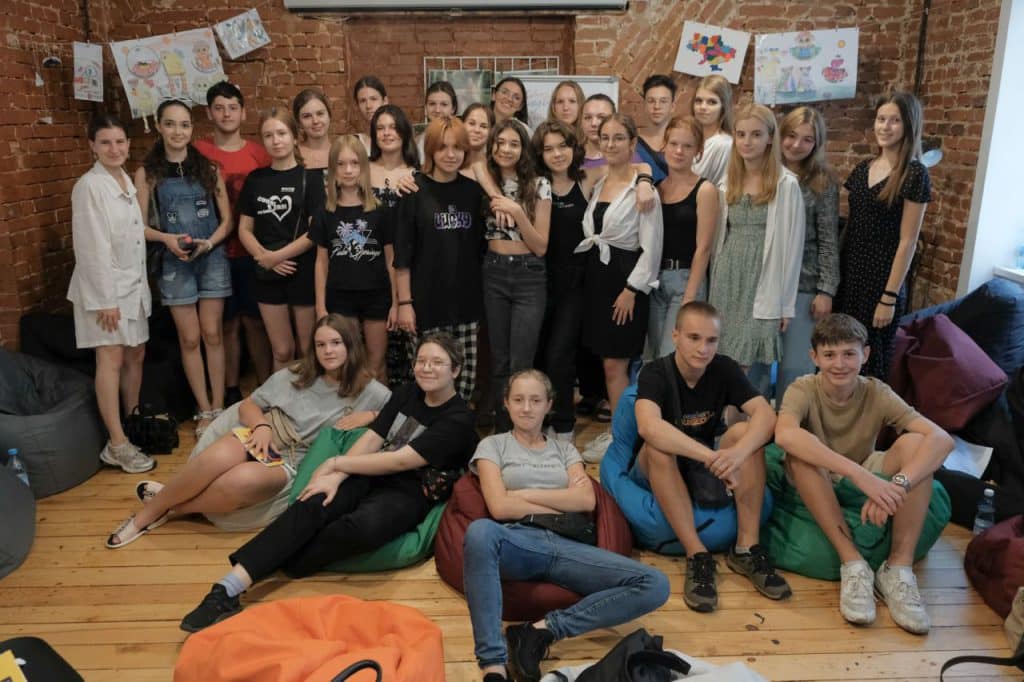
The project’s goal is to support Ukrainian teenagers who were forced to leave their homes and travel to the safer parts of Ukraine. During monthly meetings, the project’s participants have an opportunity to network and support, and establish both professional and personal connections that will help them in the future to achieve their educational and career goals.
During the first part of the meeting, teenagers have conversations with interesting speakers who share information about their jobs and also deliver a lecture on a topic they have expert knowledge of. The second half of the event is totally dedicated to the work with a therapist.
«In all the six cities we’ve managed to find professional therapists to moderate these events,» says Yelizaveta, «and they’re helping us host support groups. We invite internally displaced children and youth who arrived in the new cities to come and meet local youth. Nowadays we focused on relatively safe cities where there were as few air raids as possible and where the majority of the internally displaced people have moved.»
The organizers also aim to help these teenagers expand their communication circles to adapt to the new environment faster and easier. «We also stress in our project that success depends on the people next to you. And that’s why it’s great to build a support circle consisting of the people who are with you, in any organization.» The project coordinator also recalls that there were only seven people present during their first meeting in Khmelnytskyi. But after the event ended, they received a call from an excited event moderator who told them that teenagers who participated in the event continued talking informally after the event, as someone among the local youth offered them to go and visit a nice spot in a park nearby. «That was how we managed to reach our goals during the first meeting we organized,» says Yelizaveta.
«Event moderators expected it would be too difficult to make teenagers talk, but the majority of them were ready to talk and share»
Every time around 30 people want and are ready to attend the meetings. However, according to the organizers, even though this is already quite a big group, that’s why they are considering groups that are not bigger than 20 people. «Now there are 10-15 teenagers who visit and attend our meetings regularly,» explains Yelizaveta. «It depends on the city. There’s a usually different dynamic in every city. In Chernivtsi, there is always crowded, while in Rivne there will be only 1-2 new people joining the event through social media, and people are more careful.» But the organizers continue working on the project, and every time numbers of petticoats increase. Sometimes adults also try to register for these events but they get refused.
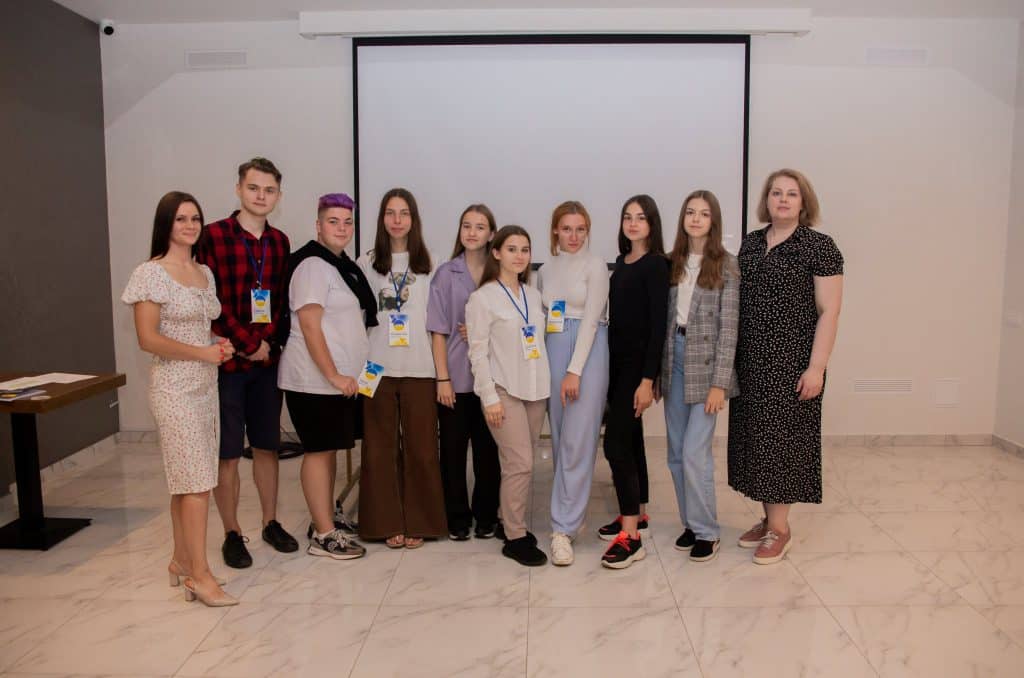
«This project is intended for the young people of 14-18 years old,» adds the project coordinator, «if a ten-year-old wants to attend we have nothing against it.» Meetings and lectures happen twice a month in every one of the six cities, and then it’s two times the monthly online event.
«Our moderators expected that it wouldn’t be that easy to make teenagers talks so openly,» says Yelizaveta, «as they’re usually more direct than adults. But the participants would start telling almost from the beginning, «I’m so happy I’m attending this psychological support group. I need to tell you something…» Most of them are ready to share.»
The «Science of Unity» coordinator recalls how once, after the event in one of the cities, a moderator was approached by two girls from Mariupol who asked for some help and details of the therapist to get personal consultations with her. The event participants have tried and are ready to continue their individual therapy as well as they are not ready to discuss some things in public.
Yelizaveta is sure that success often depends not on the topic but on the person who explains and presents this topic. «If we meet a speaker,» she adds, «and after talking with them a little bit we start thinking, «I would love to be friends with this person!», it means this is the right person, the right lecturer, a person who can make people really interested.» That’s how they all got lucky with Ivan Pidoprygora, a coordinator of the project «Smart Environment. Khmelnitskyi», who was talking a lot about waste management. Although the topic isn’t easy the lecturer was so much into it and knew how to present the material most interesting so that it really attracted the audience.
While looking for a lecturer for their events, the project organizers always work together with the local community of artists (writers, fine-art painters, musicians), journalists, social activists, and representatives of the socially conscious businesses. «It is important for us,» says Yelizaveta, «that the new city becomes a new home for these people. That’s why would like to involve the youth in various local activities available in certain regions. We haven’t launched any clubs in Kyiv as there are a lot of different initiatives there already. In addition to that, we would like to also demonstrate that it is not necessary to travel to the capital to become an interesting individual.»
Sometimes the project’s organizers are looking for lecturers based on the questions that the teenagers have. «Everything depends a lot on the region,» Yelizaveta emphasizes. «We can see that in some regions there are definitely more interested entrepreneurs, while in other regions there are more interested artists. All the cities in Ukraine are very different and have their unique features.»
The «Science of Unity» organizers work on two main moments right now. First of all, they are trying to involve more teenagers who would regularly attend these meetings on their own. There are not enough teenagers like this in some cities yet. Another moment has to do with the lack info understanding on the parents’ side. «In some cases, we meet with their concerns,» says Yelizaveta. «As we are an “integration psychological help club», this name never raises any questions. That’s why we work a lot with adults as well to explain to them what is this project about.»
«We are planning on implementing projects to rebuild the cities affected by the war in Ukraine»
The «Science of Unity» project is designed for 7 months and is supposed to finish in February 2023.
Considering its popularity, its organizers will probably continue this initiative. But this is not the only project that they are actively implementing. In July and August this year, «STEM is FEM» launched a campaign called «Science of Self-Protection» dedicated to countering human trafficking. «A lot of Ukrainians have left abroad now,» says Yelizaveta. «It’s mostly women and children. And women and children are sadly the first targets of human traffickers. Within the framework of the project, we’ve been also distributing brochures reminding them to always try their best to stay safe.»
Nowadays this public organization has launched one more project — an educational course in urban planning. Organizers tell us that they intend to choose 50 participants among the girls who stayed in Ukraine or were forced to leave Ukraine and travel abroad. During four months, they will be studying urban planning and at the end of the course, they will prepare and present their own initiatives for rebuilding and development of Ukrainian cities affected by the Russian military aggression. «There are a few ideas united in this project,» adds Yelizaveta, «and all these ideas demonstrated the necessity of urban planning and development and new approaches. Unfortunately, in Ukraine, we still don’t have a systemic approach to urban planning and development and the situation definitely requires a fresh approach. We would like to increase the voices of women in this field, as well as people with disabilities, and representatives of different ethnic and religious communities. If we want to make these cities really inclusive on all the levels, we need to hear what these people think about the way their city should be.»
In addition to that, the project’s organizers are also trying to help young people realize why it is important to come back to Ukraine and to motivate them to do so if they live and study abroad at the moment. «We would like to support the feeling of their connection with home,» adds the project’s coordinator, «even if they live and study abroad right now, within the framework of this course they will be working on their own initiatives for, let’s say, Kharkiv. It will be important for people to really see how these initiatives would be implemented in the city planning.»
A public organization «STEM is FEM» also carries out two-days day IT courses for app development for phones, machine learning, and data science. Their goal is to show the girls that there are professions that can be their future dream jobs, and if they would be interested they would be able to work in this field in the future.
At the moment, this non-governmental public organization has put a hold on any long-term plans as they all understand how fast everything develops and changes in the world. «So we will consider our audience’s needs,» Yelizaveta sums up. «For instance, urban planning will remain important for us in our activities in the nearest future. An opportunity to hear the youth and especially the girls in this profession is extremely important.»

